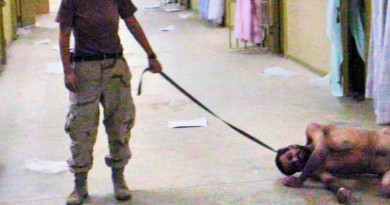Nitzavim 5773 – the hidden things are for God, the revealed for us
Originally published on the Rabbis for Human Rights website:
Deut. 29:28 “The hidden things are for the Lord our God, but the revealed things are for us and our children forever, to carry out all the words of this Torah.”
If you sin in secret, God will know. If you have yirat shamayim, if you are a “God-fearing” person, that should be enough to keep you on the straight and narrow.
The revealed things however, are for us to deal with. If we do not mete out justice when we become aware of sins, we are not fulfilling our responsibility to build a just society.
We also cannot allow our confidence that God will deal with the hidden things to be an excuse to ignore injustice around us.
We learn in the Mishnah (Pirkei Avot 2:1): “Consider three things and you will avoid sin: Know what is above you: an eye that sees, an ear that hears, and all your deeds written in a book.”
We can update that teaching in light of today’s technology: “Consider three things and you will avoid sin: Know what surrounds you: security cameras above you, cellphones that record video around you, and Twitter.”
The movie “5 Broken Cameras” is named in honor of the five cameras belonging to Palestinian journalist and filmmaker Emad Burnat that were destroyed over a five year period of filming the protests against the separation barrier at Bil’in, in the West Bank. Two were hit by bullets during filming; one was hit by a tear gas canister. That’s one courageous filmmaker.
The film brings the violence and injustice of the occupation into our living rooms. The demonstrations started because the routing of the separation barrier cut farmers off from their fields – in essence grabbing land for settlements at the expense of Palestinians. The Israeli Supreme Court eventually ruled in favor of the Palestinians, and the fence was moved.
In the film we see IDF troops dispersing crowds of unarmed demonstrators, using tear gas grenades – sometimes great fusillades of them – and in some cases live ammunition. The film shows numerous activists – not just Palestinian, but Israeli and foreign as well – injured by the IDF, and in one shocking scene a protestor is killed.
Recognizing the power of video, the B’tselem camera project is an explicit attempt to use cameras to move sins from the “hidden” to the “revealed.” Since 2007 B’tselem has distributed hundreds of video cameras to Palestinians in the West Bank to make it possible to have a record of IDF misbehavior.
The videos are admittedly somewhat flawed as a vehicle for determining exactly what happened. Did the cameraman film whatever it was that provoked the IDF response? Was the film edited?
Despite those problems, video footage has been used in disciplinary action against IDF troops. In April, 2012, Lt. Col. Shalom Eisner was sanctioned for hitting a Danish protestor, even though he himself was apparently injured in the altercation.
However, some of the footage shows events that cannot be justified because of provocation. One of the B’tselem videos shows a soldier kicking a ten-year-old child who is lying on the ground. Many sins that previously were hidden are now revealed. And it is up to us to deal with them.
If we turn a blind eye to such abuses we become parties to the crime. If we do not speak out against these wrongs, we are complicit by our silence.
We cannot put our heads in the sand and say “God will take care of it.” This week’s parsha commands us “the revealed things are for us,” they are our responsibility to address. And with the proliferation of cameras on phones, there is much more that is revealed to us.

